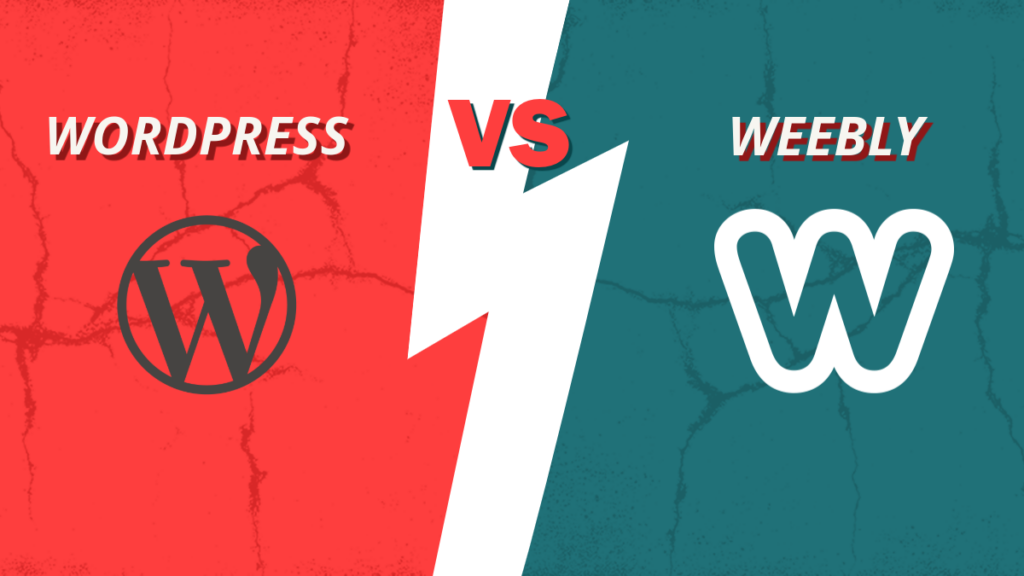In today’s digital landscape, a website is essential for small businesses and non-profits looking to engage with customers, donors, and communities. If you’re deciding between WordPress and Weebly to create your site, you’re not alone. Both are popular choices in Canada and the U.S., and each offers unique advantages. Let’s take a closer look to help you make the best choice.
Introduction to WordPress and Weebly
WordPress and Weebly serve as powerful tools for website creation but cater to different needs. WordPress, originally a blogging platform, has evolved into a robust content management system (CMS) powering over 40% of the web. It’s highly customizable and versatile, perfect for a variety of website types. Weebly, on the other hand, is known for its simplicity and is a drag-and-drop website builder. It’s geared toward small business owners or organizations looking for an intuitive, straightforward experience.
Audience Suitability:
- WordPress: Ideal for users with some technical skill or those willing to learn. Great for businesses or non-profits looking for deep customization.
- Weebly: Perfect for beginners or small teams looking to get online quickly without complex setup or coding.
Comparing Costs: WordPress vs. Weebly
Both WordPress and Weebly offer flexible pricing options, but the cost structure differs significantly.
- WordPress: WordPress is technically free, but additional costs arise from hosting, domain registration, themes, and plugins. Hosting providers such as Bluehost, SiteGround, or WP Engine offer plans starting at around $3.95/month for basic packages. Custom themes and plugins can add $50-$100 or more per year.
- Weebly: Offers straightforward pricing tiers. Basic plans start free, with premium plans ranging from $6 to $26 per month. These plans include hosting, but premium themes and apps can add extra costs.
Cost Summary:
- WordPress: Flexible, but often costs more over time with premium features.
- Weebly: Predictable, subscription-based pricing, ideal for those on a budget.
Ease of Use: Which is More User-Friendly?
For small businesses and non-profits, time is often limited, making ease of use a critical factor.
- WordPress: Offers a steeper learning curve. The WordPress dashboard is rich in features, but it can be overwhelming for beginners. Many users need initial training or guidance to navigate and configure plugins, themes, and site settings.
- Weebly: Known for its simplicity and intuitive drag-and-drop editor. No technical skills are required, and users can create and publish a site quickly. It’s ideal for those who want minimal setup time and easy management.
Ease of Use Summary:
- WordPress: Offers more flexibility but requires more time to learn.
- Weebly: User-friendly and quick to set up; ideal for users with limited technical skills.
Design Flexibility and Customization Options
The appearance of your website greatly impacts visitors’ trust and engagement. Let’s see how each platform supports design.
- WordPress: Offers thousands of themes, both free and premium, that you can customize deeply. Developers can use CSS, HTML, and JavaScript to create entirely unique designs. Small businesses often appreciate the flexibility to add personalized brand elements.
- Weebly: Provides a variety of sleek templates with the option to customize through a visual editor. Customization options are limited compared to WordPress, but the simplicity is appealing for teams looking to maintain branding without complex design processes.
Design Summary:
- WordPress: Great for those needing complete control over design.
- Weebly: Offers stylish templates but has fewer customization options.
Features and Functionality
Both WordPress and Weebly come with a range of features, but WordPress has the edge in functionality.
- WordPress: Supports a vast library of plugins, covering everything from SEO to e-commerce. Advanced features, such as membership sites, multilingual support, and detailed analytics, can be added with plugins.
- Weebly: Focuses on essential features out-of-the-box, including form builders, photo galleries, and e-commerce capabilities. While there’s an App Center for additional tools, it’s not as extensive as WordPress.
Functionality Summary:
- WordPress: More powerful, with extensive plugin options.
- Weebly: Covers essential needs but lacks WordPress’s feature depth.
SEO Capabilities
Good SEO helps your site appear in search engine results, increasing visibility to potential customers or donors.
- WordPress: Offers robust SEO capabilities with plugins like Yoast SEO, All in One SEO, and Rank Math, which provide granular control over keywords, metadata, and readability.
- Weebly: Comes with built-in SEO features but is less customizable. You can edit basic elements like title tags, meta descriptions, and image alt text, but there are limitations compared to WordPress.
SEO Summary:
- WordPress: Ideal for users focused on SEO optimization.
- Weebly: Sufficient for basic SEO but lacks advanced customization.
E-commerce Options
If you plan to sell products or accept donations online, here’s how each platform performs.
- WordPress: With plugins like WooCommerce, you get a full-featured e-commerce solution. It allows for customizable product pages, payment gateways, and inventory management.
- Weebly: Also supports e-commerce with a straightforward setup. It’s ideal for small-scale stores or donation setups but lacks advanced features.
E-commerce Summary:
- WordPress: Highly flexible, ideal for larger stores.
- Weebly: Great for small-scale stores with basic requirements.
Security and Support
Security and support are crucial, especially for small teams with limited resources.
- WordPress: You are responsible for security, including regular updates and using secure plugins. Many hosting providers offer security features, but additional plugins like Wordfence or Sucuri are often needed.
- Weebly: Weebly handles all security updates, making it ideal for users who prefer hands-off management. Dedicated support is available with all Weebly plans.
Security and Support Summary:
- WordPress: More control but requires active management.
- Weebly: Fully managed security, ideal for non-technical users.
Final Thoughts: Choosing the Right Platform
Both WordPress and Weebly offer excellent website-building options, but the best choice depends on your organization’s unique needs.
- Choose WordPress if:
- You need deep customization options.
- SEO is a priority for your team.
- Your organization has a moderate budget and some technical knowledge.
- Choose Weebly if:
- You need a quick, user-friendly solution.
- Your team lacks technical skills and prefers managed security.
- Your budget is limited, and predictable pricing is essential.
FAQs
Can I switch from Weebly to WordPress later?
Yes, it is possible to switch from Weebly to WordPress, but it requires some technical work. There isn’t an automated transfer option, so you may need to manually recreate parts of your site. Consider planning the migration with a developer if your site is complex or has a lot of content.
Which platform is better for blogging?
WordPress is generally better for blogging, as it was initially designed as a blogging platform and offers extensive features for managing posts, categories, tags, and SEO. WordPress provides greater control over customization and functionality for blogs compared to Weebly.
Does Weebly support multilingual sites?
Weebly does not have native support for multilingual sites. While it’s possible to create a multilingual website with workarounds or by using third-party apps, it can be more complex than on other platforms. WordPress, by contrast, offers plugins like WPML or Polylang for creating fully multilingual sites.
Are there free options for both WordPress and Weebly?
Yes, both WordPress and Weebly offer free options. WordPress itself is free, though you will need to cover hosting and domain costs. Weebly has a free plan with some basic features, but to remove ads and access advanced features, you would need to choose a paid plan.
Can I use a custom domain on Weebly and WordPress?
Yes, both platforms support custom domains. However, using a custom domain on Weebly requires a paid plan, while WordPress allows you to connect any domain to your site as long as you have hosting configured.
Choosing the right platform can make a significant impact on your organization’s online presence. With this comparison, we hope you feel equipped to decide which platform best meets your needs, time constraints, and budget. Whether you go with WordPress or Weebly, each step in creating your website brings you closer to achieving your organization’s mission and goals online.

